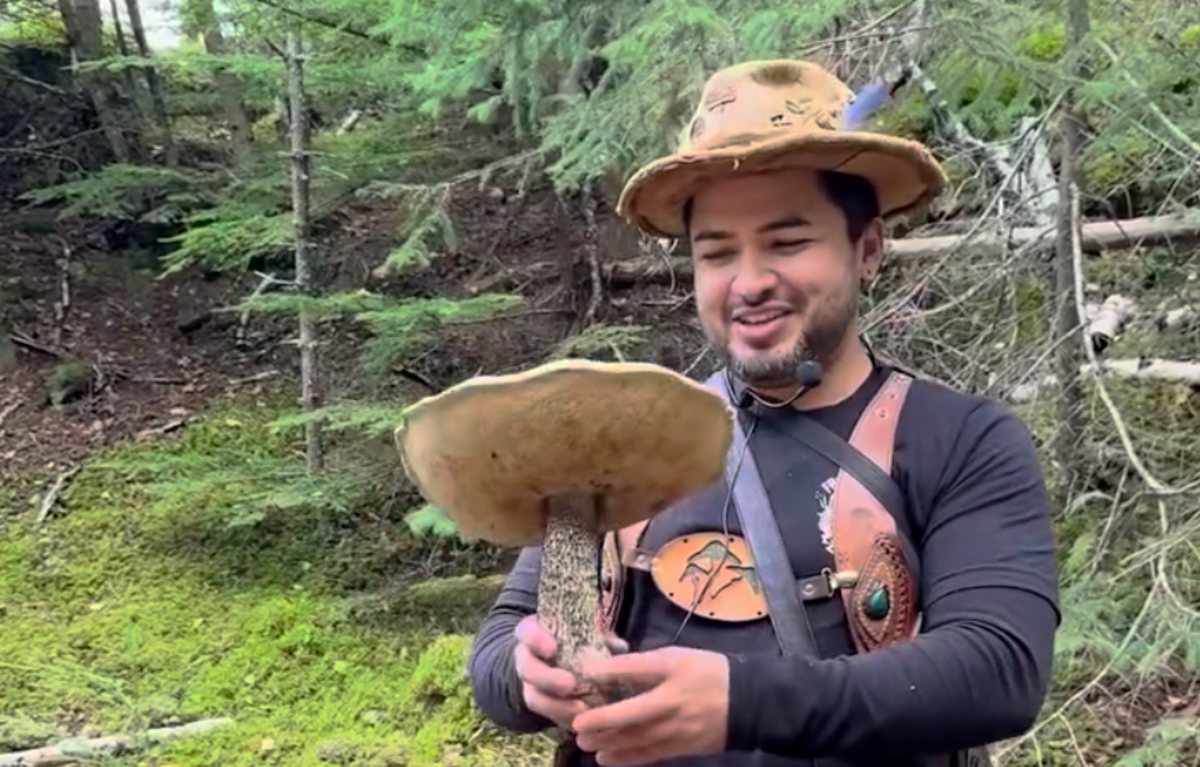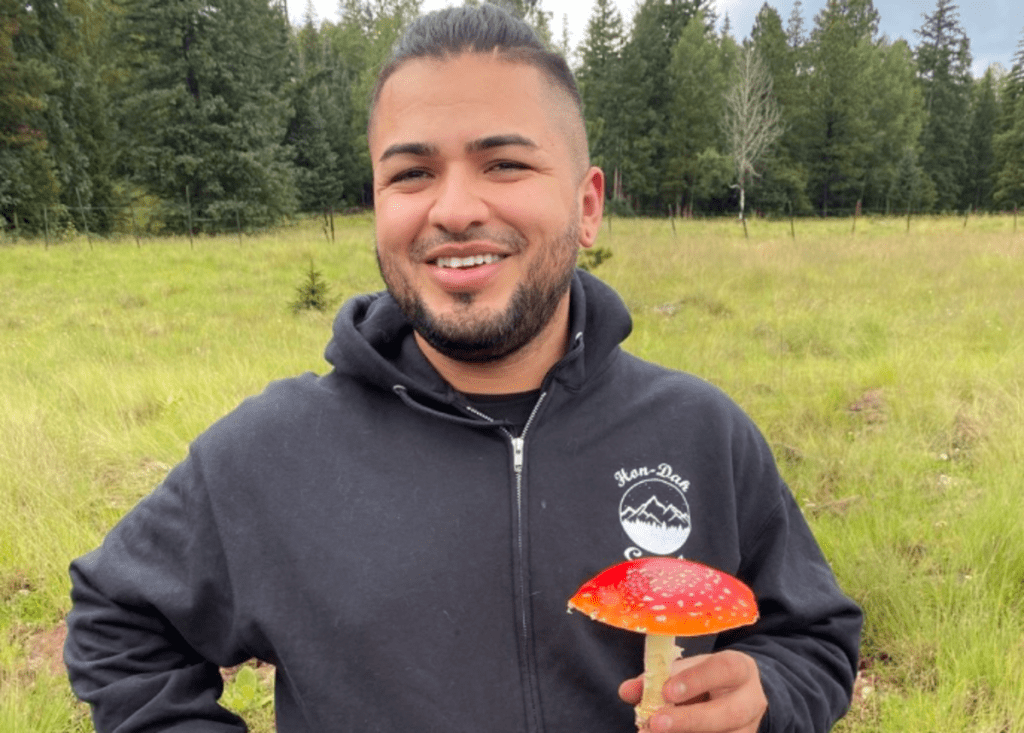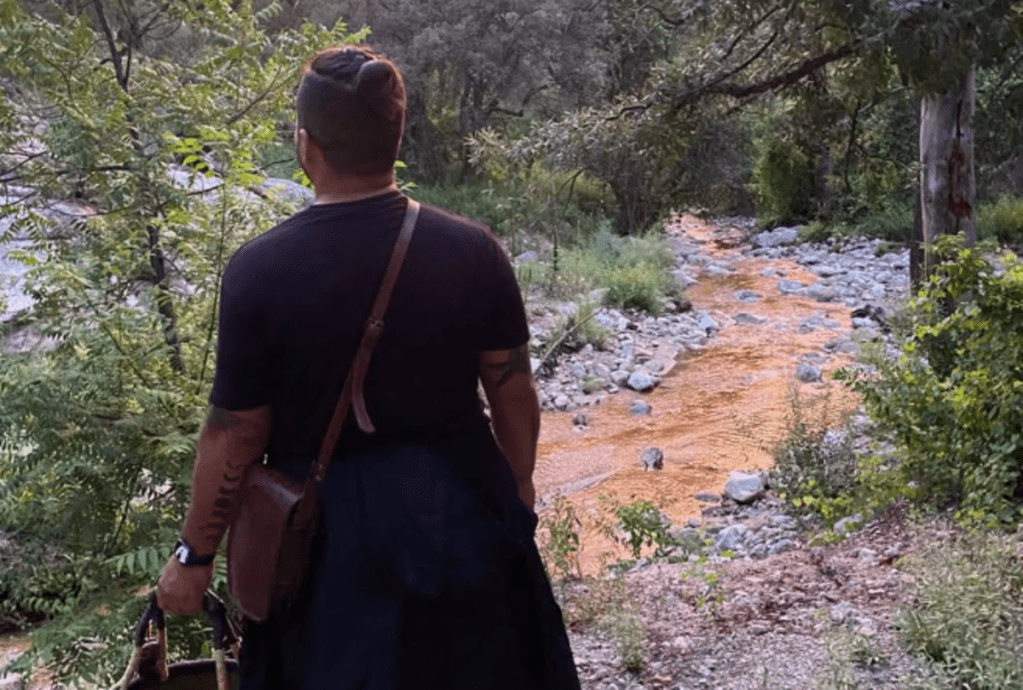
Courtesy of Hernan Castro

Audio By Carbonatix
It was August, and the vibe at the Southwest Funga Fest was appropriately crunchy and certifiably Tucson. Men and women in floppy hats and sandals sold mushroom-filled chocolates and quail eggs. Stalls peddled mushroom-based soaps, vials of fungal extracts, mushroom-shaped earrings and stickers. In one corner, a woman with pigtails did a headstand for her laughing children.
Attendees made a foray to nearby Mount Lemmon to forage for fungi. They listened as a series of speakers discussed the potential health benefits of mushrooms and how to extract their medicinal compounds. Casiana Omick, an elementary school teacher and amateur mycologist, demonstrated how to use dyer’s polypore, a mushroom common to Tucson’s Santa Catalina Mountains, to turn pale white handkerchiefs into a lovely golden yellow. In the evening, they grooved to rock bands and a DJ, bopping along to trippy music with equally psychedelic visual displays.
No “magic mushrooms” are dealt here, though. The emphasis is all on health and well-being.
One person was missing from the festivities, however — someone as central to Southern Arizona’s mushroom culture as anyone. Hernan Castro is co-organizer of the Funga Fest and the owner of Desert Alchemist, a local company that produces mushroom-derived dietary supplements.
In the world of mushrooms, Castro is a big deal. He has an Instagram following of nearly 30,000 and has been profiled by the Arizona Daily Star, the Tucson Sentinel and online magazines such as Border Lore. A self-taught guru of mycology, Castro has lectured on mushrooms at events nationwide and guided groups of initiates on foraging expeditions into the so-called “Sky Islands,” the mountains that poke up in the desert around Tucson, forming one of the most biodiverse areas in the U.S.
But on this day, the only way he was able to enjoy his own event was via a FaceTime call to Omick, his girlfriend, from prison.
Since late May, the 38-year-old Castro has been locked up at the Central Arizona Correctional Complex in Florence on what could generously be described as clerical bullshit. A green card holder who came to the U.S. as an adolescent, Castro was snapped up by federal agents on May 31 for one count of “false certification.” The federal government alleges that he lied on a form he filled out with U.S. Citizenship and Immigration Services in an attempt to obtain naturalized citizenship.
Castro faces a potential five-year sentence and possible deportation if convicted. Sources say that Immigration and Customs Enforcement has an immigration hold on him, meaning if he makes bail or is released on his own recognizance, ICE would seize him and seek his removal from the country he’s known as home for most of his life. That may be why Castro’s attorneys have successfully sought to push back his detention hearing, figuring him safer in federal lockup than he would be in immigration detention.
Castro’s case has become a cause célèbre in the Old Pueblo and in the mycology world. There have been fundraisers at local art venues and a GoFundMe page to raise money for his defense, which has netted more than $34,000 so far. Some of his friends think he was targeted by the feds due to his notoriety, others simply because he is Hispanic. One former federal prosecutor thinks authorities are coming on a bit strong about something relatively minor.
In either case, Tucson’s beloved mushroom man is currently locked in a game of chicken with the most powerful government on the planet. And all of the support he’s received is no guarantee that he will prevail.

Courtesy of Hernan Castro
Lion’s mane
Castro’s love of mushrooms can be traced back to what, in his words, amounts to a medical miracle.
He was born in Nogales on the Mexico side of the border, which was never much of a permanent impediment to his family. Castro came to the U.S. when he was 12 to live with his father, a primary care physician in Tucson. His mother is an attorney in Mexico who visits the U.S. regularly. His younger brother is a biochemist in San Diego, and Castro said that he studied biochemistry at the University of Arizona until his junior year, when he dropped out after his dad suffered a series of debilitating strokes.
Speaking to Phoenix New Times from prison, Castro recalled doctors showing him an MRI of his father’s brain, with dark areas indicating where blood flow had ceased. Those parts were “dead,” the physicians told him. It would never heal. “Once it’s gone,” they said, “it’s gone.”
“I didn’t like that answer,” Castro said. “Honestly, it scared me.”
The diagnosis led Castro down a rabbit hole of research. He began furiously reading any paper he could find on stroke recovery and nerve and brain regeneration. One mentioned a mushroom called Lion’s mane. “It’s a mushroom that has been used in Japan by Buddhist monks,” Castro said. “They claim that it helped them with meditation, with focusing, and gives them nerves of steel.” Other papers touted the use of Lion’s mane for brain regeneration and treating Alzheimer’s and children with spinal injuries.
Lion’s mane can be found growing locally, though Castro didn’t know that at the time. He ordered some of the mushrooms from China and began to grow them in his closet at home. His father read the same literature and was encouraged. Using ethanol, Castro created a tincture for his father to try taking three times a day. About six months later, Castro’s dad started regaining sensation in his toes and face. “Then he regained mobility on the whole right side of his body, and his memory and his speech improved,” he added. It’s no clinical trial, but Castro believes his father’s recovery can be attributed to the Lion’s mane.
Mushrooms had already been a subject of interest for Castro. His father’s experience turned them into a calling. He studied them, foraged for them in the nearby Santa Rita and Santa Catalina mountains and began to make tinctures as supplements for various ailments. Family and friends began requesting tinctures of their own. What was first a hobby eventually grew into Desert Alchemist, which he formed around 2017.
The mushroom production outgrew his closet and then a garage before moving to a commercial kitchen. He would also go foraging, which was best in the late summer, after the monsoons. He posted videos and photos of his finds to Instagram, YouTube and Facebook. In his videos, his passion for mushrooms is infectious, and his vast knowledge of the subject is enlightening for the uninitiated.
In one Instagram post from a foray in the White Mountains near Show Low, he displays a jumbo puff ball (Calvatia booniana), which looks vaguely testicular. Wearing his trademark chapeau, a Romanian-made cap crafted from felt-like mushrooms, he explains that when the puff balls are young, you can slice them up and make pizza out of them, though he warns they have little taste, and are known as the “tofu of mushrooms.” In another, he and a fellow enthusiast sit on a log in the drizzling rain, listening to the unworldly sounds created by a small device called a PlantWave, which supposedly converts the electrical pulses from plants into Theremin-like music. In this instance, the pair have it hooked up to a Ganoderma fallax, a flat brown mushroom protruding from a tree stump.
As his following grew, people began asking to forage with him. Eventually, he was shepherding groups of 20 or more people, charging $30 a head. He schooled them on “ethical harvesting” — that is, taking only what they plan to use — and warned them of the danger of toxic mushrooms. Castro has since traveled all over Arizona and all over the U.S., from New York to Texas and New Mexico and up and down the West Coast, foraging for fungi, speaking at conferences and communing with fellow mushroom enthusiasts. He started a campaign, still unfulfilled, to make the white king bolete, a pale mushroom with a thick stem and cap, Arizona’s official state mushroom.
“We share 50% of our DNA with mushrooms,” Castro said. “They breathe oxygen like we do. And they exhale CO₂. They’re afflicted by the same pathogens that we suffer from — a lot of the same viruses, a lot of the same bacteria and things like that. And mushrooms in the wild, they’re exposed to all these pathogens. They make a lot of metabolites to defend themselves.”
He can’t find many mushrooms in prison, where he works in the kitchen and kills time by playing chess, reading and watching TV. The worst part is being penned in.
“I get really excited when I go outside to go to the rec yard,” he said. “There’s some plants out there that I’ve been watering. I get excited about seeing the flowers.”

Courtesy of Hernan Castro
Clerical snafu
Castro landed behind bars because of a box he checked on a federal form.
For that, the federal government sent six men with guns and bulletproof “POLICE” vests to arrest him on May 31. He’s not sure which agency they represented, but they jerked him from his car at gunpoint as he and Omick were returning home from breakfast with Castro’s grandmother, who had just turned 90.
The grand jury indictment on file with the federal court accuses Castro of having “knowingly made a false certification on Form N-400,” which is the naturalization application. The indictment says he answered “no” on the form to the question “Have you ever sold or smuggled controlled substances, illegal drugs or narcotics?”
Traffic and parking tickets aside, Castro’s criminal record shows no convictions during his adult years, leaving speculation by some friends that his situation may involve an arrest that took place when he was a minor. Federal instructions for Form N-400 state that the question mentioned above includes “any offenses that happened before you reached 18.” Still, the guide does not threaten arrest — it simply says that if the applicant answers incorrectly, he or she “may be denied naturalization.”
Though Castro would be eligible for bail in criminal court, his attorney, with the agreement of the U.S. Attorney’s Office, has delayed a detention hearing again and again. The last hearing in the case took place at Tucson’s federal courthouse in early September, where Castro appeared in chains and an orange jumpsuit before U.S. Magistrate Judge Maria S. Aguilera. After 10 minutes, his detention hearing was continued for the fifth time. A jury trial is currently set for Feb. 18, 2026.
Castro’s attorney, Matthew Green, declined to comment on his client’s case, and Castro steered clear of that subject in his calls with New Times.
Though frustrating, this legal defense strategy makes perfect sense to Christine Biederman, a former Assistant U.S. Attorney who practices criminal and immigration law in Dallas. (Before becoming a U.S. Attorney, Biederman wrote for New Times’ sister paper, the Dallas Observer.) In private practice, Biederman has had some successes in similar immigration-related cases, despite the Trump regime’s anti-immigrant agenda. She said it’s wise to fight the federal case first because a win there would weaken any case for removal.
“Even if he was granted bail in the federal system, he’d be immediately transferred into ICE custody, where bond is discretionary,” she said. “And once he’s there, ICE would, in all probability, try to revoke his green card and have him removed on the pendency of the federal charges.”
A criminal conviction in the trial could also result in his eventual removal and a bar from reentering the country. But, with the caveat that she had not seen the evidence against Castro, Biederman wagered that he had a good chance of beating the rap. The government would have to prove him guilty to a jury of his peers beyond a reasonable doubt. Prosecutors would also have to demonstrate that Castro lied on the form “knowingly, intentionally and not just by some accident or mistake,” she said.
If Castro ended up in immigration court — whose judges are appointed by the U.S. Attorney General and serve at the whim of the executive branch — federal authorities would have to prove that Castro made a false statement under oath with the knowing intent to gain an immigration benefit. That presumably might be easier if Castro were convicted, which makes it all the more important to win the criminal case.
Biederman said she’d rarely seen a charge so picayune. Castro, she said, “doesn’t exactly look like Public Enemy No. 1.”
“I used to be a federal prosecutor,” she said, “and even in the Eastern District of Texas, which is not the busiest district in Texas, we didn’t bring these cases back then for lying on an application for naturalization.”
In any case, under a new rule promulgated by the Trump administration and recently upheld by the Board of Immigration Appeals, immigration detainees are routinely denied bond. Even if he got out pending trial now, ICE would snap him up and he’d go back in somewhere else.
If Castro wants to stay in the U.S., he must hold fast and fight.

Stephen Lemons
Targeted?
Among Castro’s friends and admirers, a nagging question lingers: Why was Castro targeted, especially over something so minor? Is it possible that the feds went after him because of his prominence in the Tucson area, because he’s Latino and because he deals in mushrooms, even if they’re the legal kind?
Some of his friends say yes.
Andrew Bartolic is the master brewer at Catalina Brewing Company, a neighborhood bar and brewery in Tucson. He’s known Castro for six years, collaborating with him on a seasonal, mushroom-infused beer that Bartolic said “sold out in 24 hours.” Bartolic also leases space in the back of the brewery, which Castro uses to grow some mushrooms and make and store his tinctures. He’s gone on foraging treks with Castro and uses some of his products to help with digestion and sleep.
He thinks the case against Castro is “bullshit.” “He’s a good guy,” Bartolic said. “He’s a business owner. He pays his taxes. He does stuff legally, and he’s had a huge impact in the community.” Bartolic acknowledged that mushrooms “can have a notorious reputation” for “stuff Castro was not trying to do.” Rather, Castro was “trying to make people healthier, happier and educate them.” Still, the times are troubling, and those who garner any bit of fame, no matter how circumscribed, are in peril — especially if they’re not U.S. citizens.
“I think that anyone who has a voice or a name in the community, stuff like that happens to them,” Bartolic said.
Another friend of Castro’s, musician and educator Pablo Bley, believed Castro’s predicament is emblematic of the country’s new zealously anti-immigrant regime. He said Tucson, which is about 70 miles north of the U.S.-Mexico line, is awash in fear over the feds’ aggressive immigration crackdown.
“Not just Hernan, but many people in this area have been targeted,” Bley said. “It’s pretty clear what’s happening in the streets these days.”
Bley, who is also an amateur mycologist and helped put on the Funga Fest, believes Castro will do well in court. He has the support of family and friends, a healthy war chest that’s been raised for him and competent legal counsel. That gives him a puncher’s chance, but on the other side of the ring is the federal government, which is rounding up and disappearing people and running roughshod over civil liberties.
“Let’s just say that anybody in his position is at risk at this time,” Bley said.
Should the worst happen, and Castro is removed from the U.S., the impact will be felt beyond Tucson. A mycology community that popped up in the college town, like so many mushrooms after a summer rain, will lose one of its central figures.
Tyler Hacking, a Utah agronomist and botanist who lectured at the Funga Fest, told New Times via direct message that he’s never met Castro, save through a video call that Castro did from prison for the event. He called it a “surreal experience” and credited Castro for bringing “all those people together” at the festival.
Clearly, he belongs in the community, not on the verge of deportation over a paperwork error the federal government has yet to fully detail.
“If he was actually deported and it wasn’t justifiable, I think that the mycological community would be pretty pissed overall and even outraged,” Hacking wrote. “Because nature doesn’t acknowledge any borders.”
This story is part of the Arizona Watchdog Project, a yearlong reporting effort led by New Times and supported by the Trace Foundation, in partnership with Deep South Today.